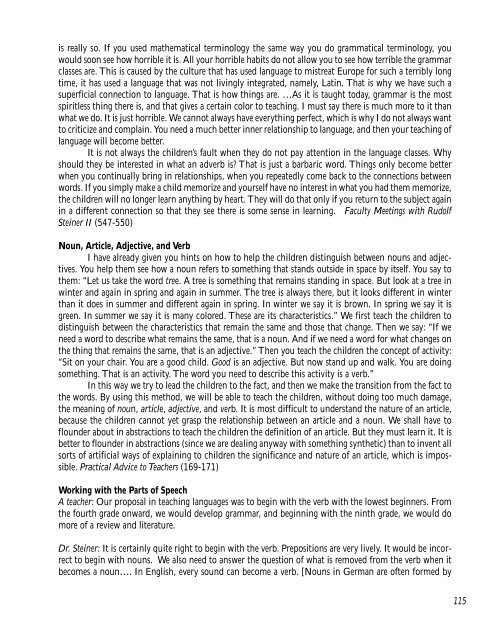Colloquium on English - Research Institute for Waldorf Education
Colloquium on English - Research Institute for Waldorf Education
Colloquium on English - Research Institute for Waldorf Education
Create successful ePaper yourself
Turn your PDF publications into a flip-book with our unique Google optimized e-Paper software.
is really so. If you used mathematical terminology the same way you do grammatical terminology, you<br />
would so<strong>on</strong> see how horrible it is. All your horrible habits do not allow you to see how terrible the grammar<br />
classes are. This is caused by the culture that has used language to mistreat Europe <strong>for</strong> such a terribly l<strong>on</strong>g<br />
time, it has used a language that was not livingly integrated, namely, Latin. That is why we have such a<br />
superficial c<strong>on</strong>necti<strong>on</strong> to language. That is how things are. …As it is taught today, grammar is the most<br />
spiritless thing there is, and that gives a certain color to teaching. I must say there is much more to it than<br />
what we do. It is just horrible. We cannot always have everything perfect, which is why I do not always want<br />
to criticize and complain. You need a much better inner relati<strong>on</strong>ship to language, and then your teaching of<br />
language will become better.<br />
It is not always the children’s fault when they do not pay attenti<strong>on</strong> in the language classes. Why<br />
should they be interested in what an adverb is? That is just a barbaric word. Things <strong>on</strong>ly become better<br />
when you c<strong>on</strong>tinually bring in relati<strong>on</strong>ships, when you repeatedly come back to the c<strong>on</strong>necti<strong>on</strong>s between<br />
words. If you simply make a child memorize and yourself have no interest in what you had them memorize,<br />
the children will no l<strong>on</strong>ger learn anything by heart. They will do that <strong>on</strong>ly if you return to the subject again<br />
in a different c<strong>on</strong>necti<strong>on</strong> so that they see there is some sense in learning. Faculty Meetings with Rudolf<br />
Steiner II (547-550)<br />
Noun, Article, Adjective, and Verb<br />
I have already given you hints <strong>on</strong> how to help the children distinguish between nouns and adjectives.<br />
You help them see how a noun refers to something that stands outside in space by itself. You say to<br />
them: “Let us take the word tree. A tree is something that remains standing in space. But look at a tree in<br />
winter and again in spring and again in summer. The tree is always there, but it looks different in winter<br />
than it does in summer and different again in spring. In winter we say it is brown. In spring we say it is<br />
green. In summer we say it is many colored. These are its characteristics.” We first teach the children to<br />
distinguish between the characteristics that remain the same and those that change. Then we say: “If we<br />
need a word to describe what remains the same, that is a noun. And if we need a word <strong>for</strong> what changes <strong>on</strong><br />
the thing that remains the same, that is an adjective.” Then you teach the children the c<strong>on</strong>cept of activity:<br />
“Sit <strong>on</strong> your chair. You are a good child. Good is an adjective. But now stand up and walk. You are doing<br />
something. That is an activity. The word you need to describe this activity is a verb.”<br />
In this way we try to lead the children to the fact, and then we make the transiti<strong>on</strong> from the fact to<br />
the words. By using this method, we will be able to teach the children, without doing too much damage,<br />
the meaning of noun, article, adjective, and verb. It is most difficult to understand the nature of an article,<br />
because the children cannot yet grasp the relati<strong>on</strong>ship between an article and a noun. We shall have to<br />
flounder about in abstracti<strong>on</strong>s to teach the children the definiti<strong>on</strong> of an article. But they must learn it. It is<br />
better to flounder in abstracti<strong>on</strong>s (since we are dealing anyway with something synthetic) than to invent all<br />
sorts of artificial ways of explaining to children the significance and nature of an article, which is impossible.<br />
Practical Advice to Teachers (169-171)<br />
Working with the Parts of Speech<br />
A teacher: Our proposal in teaching languages was to begin with the verb with the lowest beginners. From<br />
the fourth grade <strong>on</strong>ward, we would develop grammar, and beginning with the ninth grade, we would do<br />
more of a review and literature.<br />
Dr. Steiner: It is certainly quite right to begin with the verb. Prepositi<strong>on</strong>s are very lively. It would be incorrect<br />
to begin with nouns. We also need to answer the questi<strong>on</strong> of what is removed from the verb when it<br />
becomes a noun…. In <strong>English</strong>, every sound can become a verb. [Nouns in German are often <strong>for</strong>med by<br />
115

















